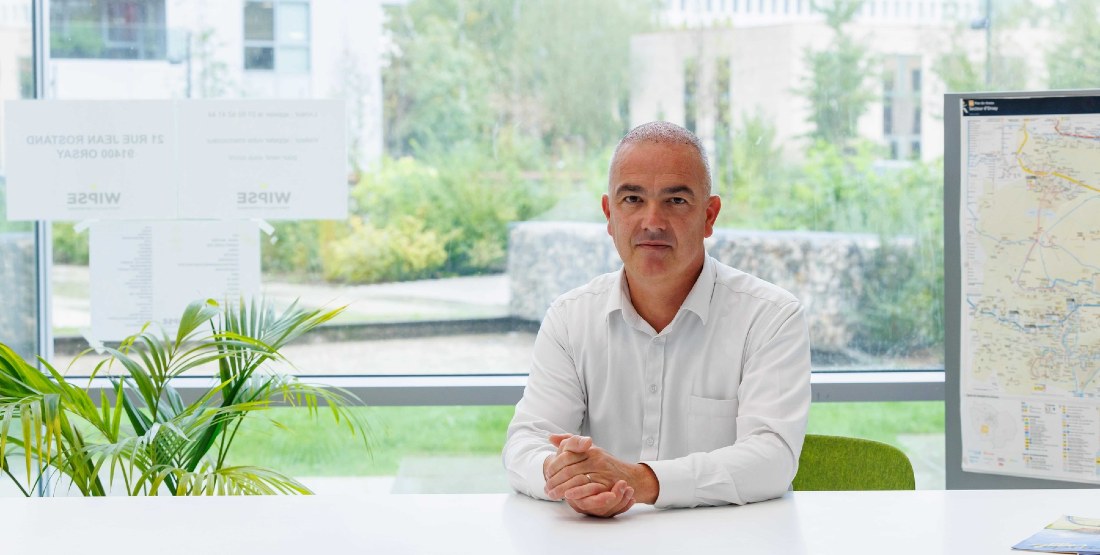Paris-Saclay required black-and-white and colour multifunction printers for office applications, as well as the capability to print in large formats and for publications.

The Paris-Saclay community has greater command of costs and confidential information after adopting a unified fleet of Kyocera printers and scanners, as well as Kyocera’s Net Manager software.
Paris-Saclay Community Case Study
The Paris-Saclay Community (Communauté d’agglomération Paris-Saclay), a cluster of 27 municipalities in the department of Essonne, which borders Paris to the south, may be “the most scientific place in France”, according to Raphaël Cadeau, the organisation’s information systems director. With two universities, nine schools of engineers, and industrial research facilities for companies such as Danone, along with important libraries and music conservatories, it keeps to a consistently high intellectual and cultural level.


Paris-Saclay required black-and-white and colour multifunction printers for office applications, as well as the capability to print in large formats and for publications.

As a government organisation, they needed to reduce operating costs by 5% each year.

They were dealing with poor document confidentiality and access visibility that had led to prior data breaches.

By consolidating their devices with Kyocera, Paris-Saclay will save €1.5 million euros over five years without sacrificing on quality.

Kyocera Net Manager allows users to print using their ID card, increasing visibility and security, and compliance with GDPR laws.

Print release technology has also reduced paper wastage, with no more documents being sent to the wrong printer, printed by mistake or forgotten at the device.

Although many organisations have changed their workplace practices substantially since the advent of COVID-19, Paris-Saclay was ahead of the global curve in embracing teleworking due to French labour laws enacted in 2012 and 2017. With much of the technical infrastructure needed to enable telework already in place, staff simply remained home after the weekend on Monday 16 March 2020 – the first day of France’s national stay-at-home order – and kept working.
With good preparation and partners, Paris-Saclay has managed to avoid many of the shocks of the past three years. In 2021, for instance, numerous supply-chain snags meant many of Mr Cadeau’s peers in IT management experienced shortages of printing supplies. But Paris-Saclay, which had recently consolidated its fleet of printing and scanning devices with Kyocera through its French distributor Managed Document Services (MDS) Partners, experienced no such disruption.
In making the decision to standardise the device fleet with Kyocera and MDS Partners, a key consideration was that the Kyocera range could meet Paris-Saclay’s needs for a variety of devices, covering not just black-and-white and colour printing and scanning for office applications, but also printing in large formats and for publication.
As a government organisation, Paris-Saclay also relied on a public tender process, where price and service levels were major considerations. Moving to Kyocera devices will save €1.5 million over five years, fulfilling an imperative to reduce operating costs by 5 per cent each year. Paying invoices is also always simple, which had not been the case with previous service providers.
One of the major ways that the new Kyocera fleet has improved the workplace experience at Paris-Saclay is through the introduction of Kyocera Net Manager (KNM). This solution lets users print through office facilities using the same card they use to access parking and pay for meals at the workplace restaurant.
The system has markedly improved security and sustainability, protecting confidential information from falling into the wrong hands and preventing paper wastage. This comes from the way users now print to a queue handled by KNM, and then head to a nearby device where they use their ID card to release the documents. Only once they show up at the device with their card is anything actually printed.
This prevents data breaches like one Mr Cadeau describes happening in the past, where a confidential document was abandoned at a printer revealing the details of recent salary increases, with no clue as to who may have been responsible. Such a situation is impossible with KNM in place, he says. There is also none of the waste common with office printing, where documents may be sent to the wrong printer and left there, be printed and forgotten, or printed by mistake and thrown away.
In these areas of confidentiality and waste reduction, the improvement from previous printing systems at Paris-Saclay is dramatic. Previously, there was simply “no control”, he says, when talking about the way KNM facilitates GPDR compliance by protecting user data. Not only does the system keep the data of those who use it securely, it even knows who printed what and where. Printing mistakes and forgotten documents, meanwhile, are deleted from the queue after 24 hours. “The system is simple, comfortable, and we can administer everything,” says Mr Cadeau.

The benefits of a system like KNM are readily apparent to anyone who’s experienced rushing to an office printer to pick up an important job before someone else grabs it by accident, or seen piles of printing mistakes stacked by the machine to be fed back in for reuse on the blank side. Security, sustainability and cost savings are all part of the gradual—and lately quickening—progress that comes from digitisation.
In talking about the move towards a paperless office, Mr Cadeau uses an appealing French term, dématérialise, which in English conjures thoughts of the way work and commerce have become rapidly less embodied since early 2020. The COVID-19 scenario has also introduced workers in Paris-Saclay to video conferencing software that staff hadn’t employed before.
Mr Cadeau sees this dematerialised world of work as one that brings greater convenience and efficiency, including in the realm of government. He’s also enthusiastic about the possibilities for using digital signatures in official business, which can already save the public time on things like property transactions and could simplify workflows for public administrators.
As digital technology dominates working life, Mr Cadeau says, it’s increasingly important that tech decisions become a concern at the highest levels of an organisation, all the way to the board of directors. When those leaders know first-hand how new solutions can improve convenience, cost and control, they will be ready to fully harness their potential to improve lifestyles and unleash digitally enabled collaboration.
